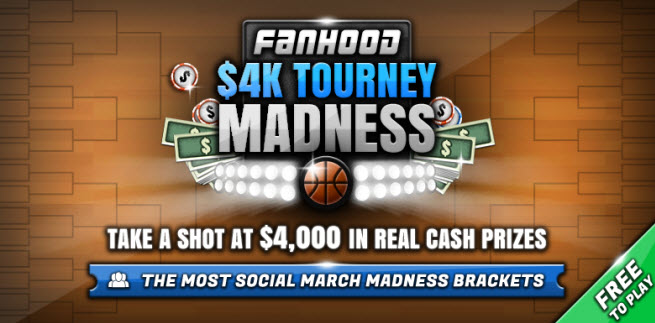Fanhood is squarely on the side of being a game, not a form of gambling, as a social fantasy sports league on Facebook. But as the market gets crowded, fans may have a hard time sorting that out.
[aditude-amp id="flyingcarpet" targeting='{"env":"staging","page_type":"article","post_id":637013,"post_type":"story","post_chan":"none","tags":null,"ai":false,"category":"none","all_categories":"business,games,social,","session":"A"}']Today, Fanhood is announcing its Most Social March Madness Brackets, where players can join a virtual pool and bet virtual coins on who will win the popular college basketball tournament. The bracket is specifically designed to leverage Facebook’s features and communication channels. It also has a sweepstakes where you can actually win a $4,000 cash prize.
If it catches on, it could be big. There are more than 75 million people who fill out March Madness brackets each year. Fanhood wants to offer a social-betting platform that is lightweight and consumes less time to alternatives like fantasy football or real-money online sports gambling (which is mostly illegal in the U.S., except for horse racing).
AI Weekly
The must-read newsletter for AI and Big Data industry written by Khari Johnson, Kyle Wiggers, and Seth Colaner.
Included with VentureBeat Insider and VentureBeat VIP memberships.
On top of its social bracket where you can talk smack with friends, Fanhood offers challenges, pools, and sports-trivia games to keep players engaged when there is no live game happening.
Brandon Ramsey, the chief executive officer and founder of Fanhood, said, “This long overdue modernization of ‘bracketology’ will give a serious social boost to the tournament and is a big win for fans.”
Fanhood will have lots of competition. FanDuel, a fantasy site in New York, received $11 million from investors including Comcast. Other rivals include Gamblino, RocketPlay, OHK Labs (SportsPicker Challenge), Pickmoto, Bragstr, and BetHubb. Ben Peters, the co-founder of Pickmoto, said his company is also launching a new March Madness mobile app that can be used to create an office pool.
“Office pools are still being run by email and spreadsheet,” Peters said. “We’re bringing this space to mobile. We want to make it easy for fans to make predictions, compete with friends, and smack talk in a couple of minutes from anywhere.”
“It becomes akin to a flip of the coin, which is the definition of gambling,” Robert Bowman, the chief executive of Major League Baseball Advanced Media, the league’s Internet company, told the New York Times.
As the Times pointed out, fantasy sports have been around for decades, and entry into leagues often includes fees and payouts. But the “Unlawful Internet Gambling Enforcement Act of 2006 finally established their legality by including an exemption for wagering on games of skill in which the winners were not determined by the outcome of a single game or the performance of a single player.” The Times said that free games are widely available, but sites that allow players to risk real money have gained the most traction.
[aditude-amp id="medium1" targeting='{"env":"staging","page_type":"article","post_id":637013,"post_type":"story","post_chan":"none","tags":null,"ai":false,"category":"none","all_categories":"business,games,social,","session":"A"}']
In Fanhood’s game, as with other social sports-betting games, you can’t cash out. That’s different in legality compared to online games where you can put money in and cash it out. Frank Wilson, the co-founder of social-mobile sports-betting firm Gamblino, said, “The fact that the legal landscape is shifting so rapidly has the entire industry watching closely — it will be exciting to see what unfolds over the next few years.”
VentureBeat's mission is to be a digital town square for technical decision-makers to gain knowledge about transformative enterprise technology and transact. Learn More

